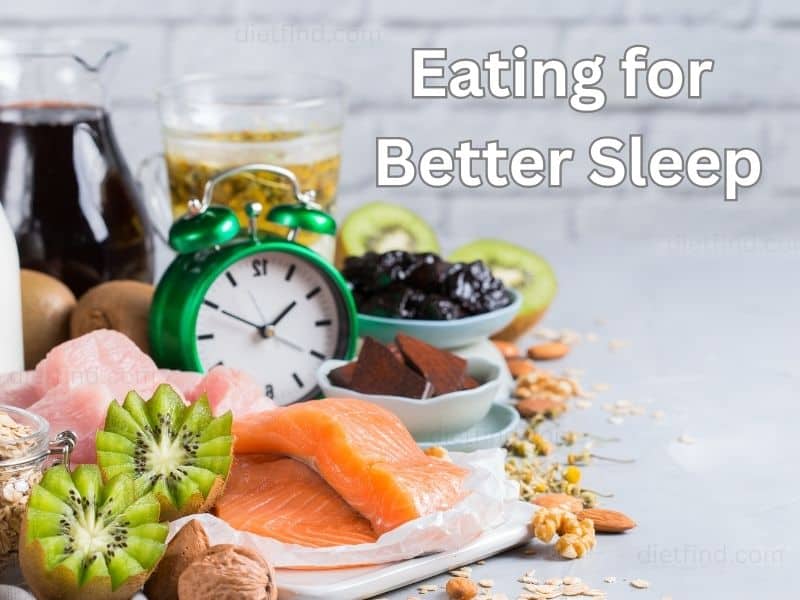A Journey to Better Sleep Through Food
Do you ever lie awake at night, tossing and turning, wishing for the sweet relief of sleep? It’s a scenario many of us know all too well. But have you ever considered that the key to better sleep might be on your dinner plate, not in a pill bottle? The link between diet and sleep is stronger than you might think.
The Science of Sleep and Diet
Research has shown that what we eat can significantly impact how we sleep. A study published in the Journal of Clinical Sleep Medicine found that those who ate less fiber, more saturated fat, and more sugar were more likely to experience lighter, less restorative sleep with more disruptions [1]. This implies that eating a diet rich in fiber and low in sugar and saturated fats can pave the way to better sleep.
Notably, a study in the journal Nutrients found that high-protein diets improved sleep quality [2]. However, it’s not just about what we eat, but also when we eat. Consuming a large meal too close to bedtime can interfere with our body’s natural processes, leading to discomfort and disturbed sleep [3]. Therefore, it is critical to consider both the type of food and the timing of your meals.
Fruits for Dreams
If you’re struggling with sleep, you might want to consider adding more fruits to your diet. Kiwis, for instance, are packed with vitamins C and E, serotonin, and folate—all of which are believed to benefit sleep. A study in the Asia Pacific Journal of Clinical Nutrition found that participants who ate two kiwis one hour before bedtime over a four-week period fell asleep 42% more quickly than when they didn’t eat anything before bedtime [4].
Cherries, particularly tart cherries, are another fruit known to promote better sleep. They are one of the few natural food sources of melatonin, the chemical that controls the body’s internal clock to regulate sleep. Researchers from Louisiana State University found that drinking tart cherry juice twice a day for two weeks helped increase sleep time by nearly 90 minutes among older adults with insomnia [5].
A Grain of Sleep
Whole grains are a fantastic source of magnesium, a mineral that’s been shown to induce better sleep. Some studies have linked a lack of magnesium to trouble sleeping. A review published in the Journal of Research in Medical Sciences indicated that magnesium supplements could be beneficial for insomnia, particularly in older adults [6].
In particular, foods like whole grain bread, oatmeal, and brown rice can boost your magnesium levels and potentially improve your sleep quality. Yet, as important as these whole grains are, remember that a balanced diet is still essential.
Sip Yourself to Sleep
What we drink can affect our sleep as much as what we eat. Certain teas, like chamomile and passionflower tea, are renowned for their sleep-promoting properties. A study published in the Journal of Advanced Nursing found that new mothers who drank chamomile tea for two weeks reported better sleep quality compared to a group that did not drink chamomile tea [7]. However, it’s crucial to remember that while these drinks can aid sleep, they are not a magic bullet. They should be consumed as part of a healthy, balanced diet.
The Protein-Sleep Connection
Lean proteins are a beneficial part of any diet, but they’re especially important for those seeking better sleep. Foods like chicken, turkey, and fish are high in tryptophan, an amino acid that increases the production of serotonin in our brains. Serotonin is a neurotransmitter that helps regulate our mood and sleep cycles. Tryptophan is also a precursor to melatonin, the hormone that regulates our sleep-wake cycle.
A 2016 study published in the American Journal of Clinical Nutrition found that diets high in protein resulted in improved sleep quality after just three to four weeks [8]. Keep in mind, though, that it’s important to choose lean proteins to avoid high levels of saturated fat that can disrupt sleep.

Dairy Delights for Dreamy Nights
Dairy products might also offer sleep benefits. They contain tryptophan but also provide calcium, which helps the brain use tryptophan to manufacture melatonin. A glass of warm milk has long been recommended to those struggling to sleep, and there may be some science behind this old wives’ tale.
Notably, a study from the Australian Centre for Integrative Clinical and Molecular Medicine found that two groups of women who were given a diet with high or low amounts of dairy products both improved their sleep, but the group consuming the high dairy diet fell asleep faster and had more restful sleep [9]. Dairy products such as milk, cheese, and yogurt can be a great addition to your diet for better sleep.
Nuts and Seeds for Nighttime Rest
Nuts and seeds are another great sources of tryptophan and magnesium, both of which promote better sleep. Almonds, walnuts, flaxseeds, and pumpkin seeds are among the best choices.
Walnuts, in particular, are a source of melatonin. A study published in the journal Nutrition found that consuming walnuts increased levels of melatonin and its metabolites in the blood, leading to improved sleep [10].
Seafood for Serene Nights
Seafood, including salmon, tuna, and shrimp, is another excellent food group that promotes better sleep. These foods are not only rich in high-quality proteins but are also an excellent source of vitamin B6, which your body needs to produce melatonin. A study published in the American Journal of Clinical Nutrition found that individuals who consumed Atlantic salmon three times a week for six months fell asleep about 10 minutes faster than those who ate chicken, pork, or beef [11].
Stay Hydrated, Sleep Better
While it’s not directly food, staying properly hydrated is crucial for better sleep. Dehydration can lead to dry mouth and throat, causing discomfort and potential sleep disruption. Water is vital, but be careful with timing; drinking too much too close to bedtime can lead to nocturnal bathroom trips, interrupting your sleep.
Foods to Avoid for Better Sleep
It’s also crucial to know which foods might be sabotaging your sleep. Foods and drinks high in caffeine, such as coffee, chocolate, and energy drinks, can keep you awake at night. Spicy foods can lead to indigestion and disrupt sleep, while high-sugar foods can alter your ability to stay asleep.
Additionally, alcohol, often mistaken as a sleep aid, can significantly reduce the quality of your sleep. Although alcohol may make you feel sleepy, it interferes with your body’s sleep cycle once you fall asleep, leading to disrupted and non-restorative sleep [12].
Here’s a convenient table listing some of the sleep-encouraging foods:
| Foods to help sleep | How They Promote Better Sleep |
|---|---|
| Kiwi | Kiwi is high in serotonin, a neurotransmitter that helps regulate sleep cycles. |
| Tart Cherries | Tart cherries are a natural source of melatonin, which helps regulate sleep. |
| Almonds | Almonds contain melatonin and magnesium, both of which can aid in better sleep. |
| Walnuts | Walnuts are also a source of melatonin and have a high antioxidant capacity. |
| Chamomile Tea | Chamomile tea has apigenin, an antioxidant that promotes sleep. |
| Warm Milk | The tryptophan and calcium in milk can help promote better sleep. |
| High Fiber Foods | High fiber foods are linked with more restorative slow-wave sleep. |
| High Protein Foods | They increase satiety, which can help maintain sleep throughout the night. |
| Fatty Fish | They are rich in vitamin B6, needed for melatonin production. |
| Hydration | Proper hydration prevents dry mouth and throat, causing discomfort and potential sleep disruption. |
The Bottom Line
Achieving better sleep isn’t just about what you put in your body; it’s also about what you don’t. Nourishing your body with the right foods can certainly promote better, more restful sleep, but avoiding certain foods is equally important. Remember that these dietary changes should be part of a broader lifestyle approach that includes maintaining a regular sleep schedule and creating a tranquil sleep environment.
References:
- Fiber and Saturated Fat Are Associated with Sleep Arousals and Slow Wave Sleep – Journal of Clinical Sleep Medicine, 12(01), 19–24.
- Higher-protein diets improve indexes of sleep in energy-restricted overweight and obese adults: results from 2 randomized controlled trials – The American Journal of Clinical Nutrition, 103(3), 766–774.
- Relationship between Food Intake and Sleep Pattern in Healthy Individuals – Journal of Clinical Sleep Medicine, 7(06), 659–664.
- The effect of kiwifruit consumption on sleep quality in adults with sleep problems – Asia Pacific Journal of Clinical Nutrition, 20(2), 169–174.
- Effects of a Tart Cherry Juice Beverage on the Sleep of Older Adults with Insomnia: A Pilot Study – Journal of Medicinal Food, 13(3), 579-583.
- The effect of magnesium supplementation on primary insomnia in elderly: A double-blind placebo-controlled clinical trial – Journal of Research in Medical Sciences, 17(12), 1161-9.
- Preliminary examination of the efficacy and safety of a standardized chamomile extract for chronic primary insomnia: A randomized placebo-controlled pilot study – BMC Complementary and Alternative Medicine, 11, 78.
- Higher-protein diets improve indexes of sleep in energy-restricted overweight and obese adults: results from 2 randomized controlled trials – The American Journal of Clinical Nutrition, 103(3), 766–774.
- Effect of milk and other dairy products on the sleep-wake cycle – Journal of the American College of Nutrition, 32(4), 273-280.
- Melatonin in walnuts: Influence on levels of melatonin and total antioxidant capacity of blood – Nutrition, 21(9), 920-924.
- Fish consumption, sleep, daily functioning, and heart rate variability – Journal of Clinical Sleep Medicine, 10(5), 567-575.
- Alcohol and sleep I: effects on normal sleep – Alcoholism, clinical and experimental research, 37(4), 539-549.
© 2023 by DietFind.com. All rights reserved. No part of this document may be reproduced or transmitted in any form or by any means, electronic, mechanical, photocopying, recording, or otherwise, without prior written permission of DietFind.com.

